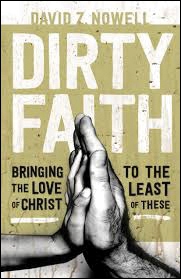 By David Z. Nowell (Bethany House, 2014)
By David Z. Nowell (Bethany House, 2014)
Dirty Faith, written by the president of Hope Unlimited for Children, describes the work the organization has done in Campinas, Brazil: evangelizing, schooling, and rehabilitating street children. It has reached some 500 of these “hungry, exploited, abused, and abandoned” kids by intervening in their lives of theft and prostitution and by visiting those trapped in violent and filthy prisons.
This book is a call for Christians to leave the pew and live out faith in service. “Far too often we want to hire someone to do our Christianity for us, to pay the pastors and missionaries—the ‘professional’ Christians—to do the work we are all called to do.” In other words, we are called to get our hands dirty—hence, “dirty faith.” Yet the author’s tone does more to criticize than to inspire. “The church needs to be reminded that spending 85 percent of its resources on salaries, facilities, and other internal needs of the congregation makes a mockery of the Great Commission,” Nowell writes.
Nowell frankly describes one season of funding struggles: “As costs skyrocketed in Brazil, the exchange rate plummeted. Silicon Valley, the source of much of our U.S. support, dried up financially with the dot-com crash.” This emergency was met by a last-minute miracle, when the vice governor of São Paulo, Brazil stepped in with an offer of local support.
Funding is always the problem, and Dirty Faith sometimes reads like a development office pamphlet: “Does your church budget specifically provide funding for an organization rescuing children from the sex trades?” and “Invest in the followers who are making a difference in the lives of these children.”
The author’s most thoughtful discussion comes later, when he invites critical evaluation of First World efforts abroad, though only a few readers may wade through enough recrimination to reach the book’s third section.
This review appeared in the January 2015 issue of U.S. Catholic (Vol. 80, No. 1, page 43).














Add comment